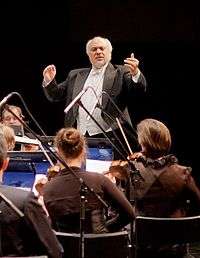Constantine Orbelian

Constantine Garrievich Orbelian, Jr. (Armenian: Կոնստանտին Օրբելյան, Russian: Константин Гарриевич Орбелян, born San Francisco, 27 August 1956) is an American conductor and pianist of Armenian and Russian descent. He is named after his paternal uncle Konstantin Orbelyan, a major Armenian composer.[1]
Biography
Born in San Francisco to Russian and Armenian emigré parents, Constantine Orbelian made his debut as a piano prodigy with the San Francisco Symphony at the age of 11. After graduating from Juilliard in New York, he embarked on a career as a concert pianist appearing with major symphony orchestras throughout the U.S., U.K., Europe, and Russia. His recording of the Khachaturian piano concerto with conductor Neeme Järvi won “Best Concerto Recording of the Year” award in the United Kingdom.
Orbelian’s appointment in 1991 as Music Director of the Moscow Chamber Orchestra was a breakthrough event: he is the first American ever to become music director of an ensemble in Russia. A tireless champion of Russian-American cultural exchange and international ambassadorship through his worldwide tours, he was awarded the coveted title “Honored Artist of Russia” in 2004, a title never before bestowed on a non-Russian citizen. In May 2010, Orbelian led the opening Ceremonial Concert for the Cultural Olympics in Sochi — the first event setting the stage for Russia's hosting of the Olympic Games in 2014. In 2012 the Consulate in San Francisco awarded him the Russian Order of Friendship Medal, whose illustrious ranks include pianist Van Cliburn and conductor Riccardo Muti, and which singles out non-Russians whose work contributes to the betterment of international relations with the Russian Federation and its people.
From his 1995 performance at the 50th Anniversary Celebrations of the United Nations in San Francisco, to his 2004 performance at the U.S. State Department commemorating 70 years of diplomatic relations between Washington and Moscow, and a repeat State Department appearance in 2007, all with the Moscow Chamber Orchestra, Orbelian continues to use his artistic eminence in the cause of international goodwill. He and his orchestras have also participated in cultural enrichment programs for young people, both in Russia and the U.S. In 2001 Orbelian was awarded the Ellis Island Medal of Honor, an award given to immigrants, or children of immigrants, who have made outstanding contributions to the United States.[2] He was awarded by the Order of Friendship of Armenia in 2015.
He has been chief conductor of the Kaunas City Symphony Orchestra [3] in Lithuania since 2014, and in 2016 he was appointed the artistic director of Armenia's Yerevan Opera Theatre.[4]
Discography
He has an extensive discography, mainly for Delos Productions.[5] A politically and artistically significant recording was the programme "Where Are You, My Brothers?" in the spring of 2003 in front of an audience of 6,000 at the Kremlin Palace in Moscow, of new arrangements of songs from the World War II era performed by Dmitry Hvorostovsky and the Moscow Chamber Orchestra. The telecast was seen on Russian Television by over 90 million viewers. The same programme was performed with the St. Petersburg Symphony Orchestra for survivors of the Siege of Leningrad on January 16, 2004. His 2014 recording of Virtuoso Rossini Arias[6] with tenor Lawrence Brownlee was nominated for a Classical Solo Vocal Album Grammy Award and a 2015 Vocal Recital International Classical Music Awards.
Videography
- Renée Fleming and Dmitri Hvorostovsky A Musical Odyssey in St Petersburg / State Hermitage Orchestra, Constantine Orbelian / Decca
- Anna Netrebko and Dmitri Hvorostovsky LIVE FROM RED SQUARE MOSCOW / State Academic Symphony Orchestra
"Evgeny Svetlanov", Conducted by Constantine Orbelian / Deutsche Grammophon
References
- ↑ Bio "Harry's younger brother, Konstantin, who was only 11 when the two boys were cast out on the street upon the arrest of their parents, was a talented pianist who managed to get a job playing the piano in the circus at that tender age. He eventually became a leading composer of popular songs and film scores in Russia."
- ↑ Biography
- ↑ http://kaunosimfoninis.lt
- ↑ Slipped Disc Announcement
- ↑ Discography
- ↑ Virtuoso Rossini Arias